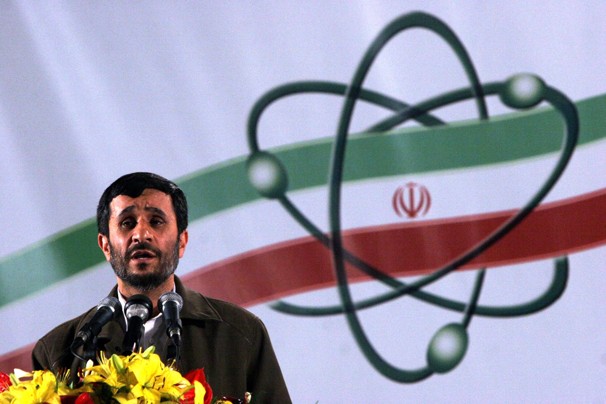UPDATES
Iran escalates its uranium enrichment
January 12, 2012 | Sharyn Mittelman

The International Atomic Energy Agency (IAEA), confirmed on January 10, that Iran has started enriching uranium up to 20 percent at an underground site at ‘Fordow’, near the Shi’ite Muslim holy city of Qom.
The IAEA stated, “The IAEA can confirm that Iran has started the production of uranium enriched up to 20 percent … in the Fordow Fuel Enrichment Plant”.
Over five years ago, the UN Security Council called on Iran to stop enriching uranium, which can fuel nuclear reactors or atom bombs. Instead, Iran ignored the Security Council and accelerated its efforts.
Iran has maintained that its nuclear program is for civilian peaceful purposes. However, the underground enrichment facility ‘Fordow’ casts further doubt on Iran’s statements that the facility is for civilian purposes. The site was an Iranian secret that was only revealed in September 2009 by the US, France and Britain.
Iran’s enrichment of uranium at 20 percent also suggests that that its nuclear program is not for civilian use, which would enrich uranium at around 3.5 percent – the level needed for nuclear power plants. It has also furthered concerns because the process of obtaining 20 percent enriched uranium represents most of the work needed to get the uranium enriched to the level of 90 per cent or above required for atomic weapons.
In addition to enriching uranium at 20 percent, the fact that Fordow was kept secret and was built in the mountains so that it would be nearly impossible to target militarily has also raised suspicions.
Iran’s dismissal of findings by the IAEA of secret experimental work on a nuclear weapons program also worries the international community.
New reports from the IAEA have led to fierce criticism of Iran from many in the international community.
British Foreign Secretary William Hague called the move “a provocative act which further undermines Iran’s claims that its program is entirely civilian in nature.”
US Deputy Ambassador Rosemary DiCarlo said that Iran had “no justification for enriching uranium at this level.” The US responded by stating that if Iran is enriching uranium to 20 percent at an underground facility at Fordow, this would be a “further escalation” of its pattern of violating its obligations under UN Security Council resolutions.
Secretary of State Hillary Rodham Clinton stated, “This step once again demonstrates the Iranian regime’s blatant disregard for its responsibilities and that the country’s growing isolation is self-inflicted”.
On January 11, France, Britain, Germany and the US in a closed-door meeting of the UN Security Council condemned Iran’s decision to begin enriching uranium at an underground bunker.
While the criticism is aimed at putting pressure on Iran to curb its nuclear program, the UN Security Council most likely would not impose a fifth round of UN sanctions on the Iranians due to resistance from veto powers Russia and China.
In response to sanctions, Iran has recently threatened to shut the Strait of Hormuz, the outlet for 40 percent of the world’s traded oil.
Iran claims that it called for fresh nuclear talks with the permanent members of the UN Security Council and Germany, a group known as the “P5+1”. However, French Deputy Ambassador Martin Briens said it was Iran that was preventing the resumption of negotiations with the P5+1, he said, “We keep on trying to get … serious negotiations to start, but so far Iran has not responded”.
The US imposed additional sanctions on Iran last month and the EU is expected to agree on a ban on imports of Iranian crude oil later this month.
Russia and China also voiced some concern about Iran’s latest nuclear announcement. Britain’s Deputy UN Ambassador Philip Parham said, “Russia also said this was a matter for concern and China talked about the need to comply with international obligations.”
A Russian foreign ministry official said, “Moscow has met reports on the start of uranium enrichment at an Iranian plant near Qom with regret and concern.” The official also said: “We should recognize that Iran is continuing to ignore the demands of the international community that it respond to their concerns regarding its nuclear program”.
Nevertheless, Russian Deputy Foreign Minister Sergei Ryabkov said on January 11, that Russia opposed US and possible European oil sanctions against Iran, even if Iran presses ahead with uranium enrichment.
China says similar things, but American foreign policy expert China is cutting its oil imports from Iran and driving a hard bargain on future oil purchases.
Despite sanctions Iran remains defiant. In a televised speech on January 10, Supreme Leader Ayatollah Ali Khamenei said: “Sanctions imposed on Iran by our enemies will not have any impact on our nation. The Iranian nation believes in its rulers.”
Nevertheless sanctions remain crucial in putting pressure on Iran to change its ways, and there are numerous signs, including admissions from Iranian officials, that they are having significant effects – see here, here and here.
In addition to sanctions, Dennis Ross, President Obama’s former top Iran adviser, said that the US president would strike Iran to keep the Islamic Republic from acquiring a nuclear weapon: “The Iranians should never think that there’s a reluctance to use the force”.
The US has increased its military presence in the Persian Gulf and in the coming weeks will launch its largest-ever joint anti-missile defence exercise with Israel.
It remains unclear if there is any link between Iran’s latest provocative steps and the assassination of another prominent Iranian nuclear background information on developed by The Israel Project.
Sharyn Mittelman
Tags: Iran





